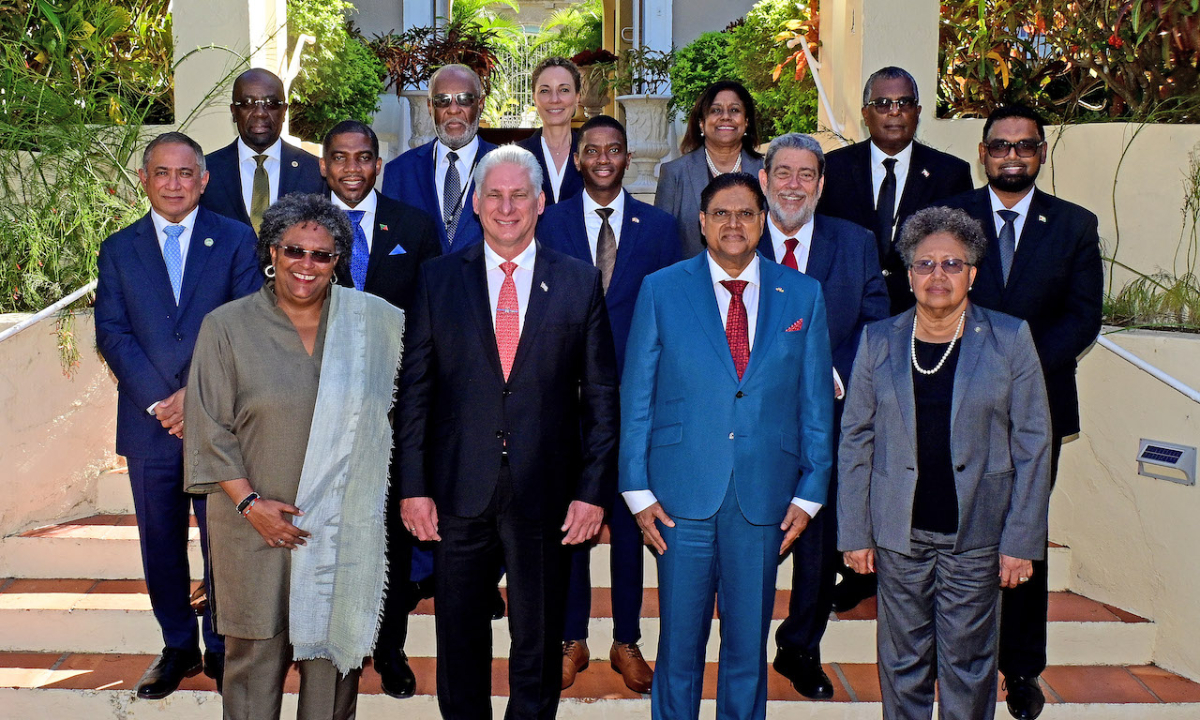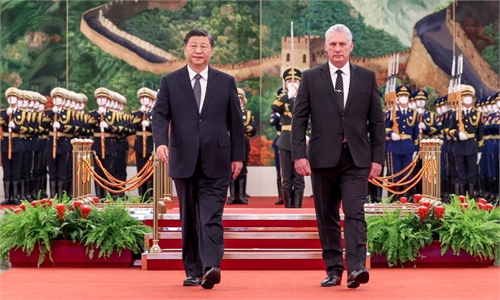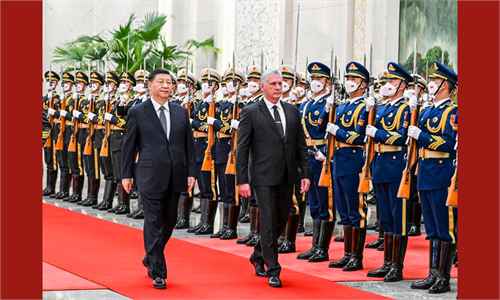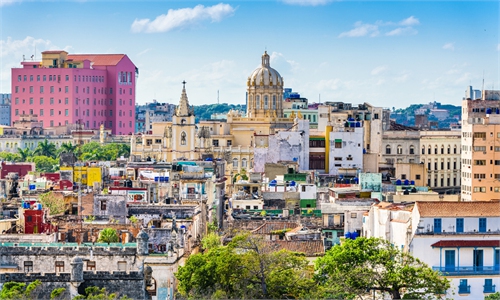Caribbean Community countries call for an immediate end to US financial blockade against Cuba, vowing to enhance cooperation

Leaders of Caribbean Community countries with Cuban President Miguel Mario Díaz-Canel during the eighth CARICOM-Cuba Summit. Photo: Barbados Today
Barbados' Prime Minister Mia Amor Mottley and the chairman of the Caribbean Community (CARICOM) Chandrikapersad Santokhi called for an immediate and unconditional end to the economic, commercial, and financial blockade implemented by the US government against Cuba on Wednesday during the eighth CARICOM-Cuba Summit.Held in Bridgetown, Barbados, the Summit is designed to commemorate the 50th anniversary of establishing diplomatic relations with the independent States of CARICOM and Cuba and the 20th anniversary of CARICOM-Cuba day.
During the Summit, Mottley said the international trade embargo was not "rational" while Santokhi labelled the action "unjust" and against the United Nation's principles of sovereignty and territorial integrity, Barbados Today reported.
"The Caribbean Community condemns unreservedly the continuation of the economic trade and financial embargo imposed on Cuba by the US and is steadfast and unrelenting in our calls for its immediate cessation," Santokhi said.
In her address, Mottley suggested that CARICOM needs to strengthen its ties with Cuba more than ever as the region continues to face issues related to climate change, gun crime, health crises and adequate access to nutritious food and clean water.
"If there was ever a time for us to recommit our efforts to work together, not just for one Caribbean but also as countries of the Global South, it is now. This world is facing the greatest challenges perhaps in the last century that we have seen," Mottley urged.
Following the meeting, the participating countries issued a declaration and reached areas of consensus on future cooperation.
Aware of the importance of continuing to work together, particularly in building economic and climate resilience toward the sustainable development of these countries and for inclusive, just and equitable societies, the declaration affirms the importance of strengthening South-South Cooperation as an expression of solidarity among member countries and for the promotion of bilateral, regional and triangular cooperation and programs for development, within the framework of the development priorities of member countries.
The declaration also referenced that the presidency of Cuba of the Group of 77 and China during 2023 is an excellent opportunity to take advantage of the synergies between the CARICOM and G-77 agendas to promote the development of their members, and foster solidarity and international cooperation.
Deeply grieved by the loss of lives and concerned by the extensive socioeconomic effects of the COVID-19 pandemic and other infectious diseases, and the devastating, more frequent and intense weather events that have worsened resulting from multiple crises faced by mankind today, all countries attending the Summit agreed to share best practices in the management of the COVID-19 pandemic and other epidemiological conditions common to the Caribbean, and continue to assess the potential for the application of innovative Cuban biotech medicines for the prevention and treatment of COVID-19 and other infectious diseases, the declaration noted.
Recognizing that the invaluable cooperation between CARICOM members and Cuba in areas such as health, education, agriculture, human resource development and capacity building, construction, sports, and disaster risk reduction and mitigation has significantly contributed to both national and regional development and enhanced the wellbeing of local peoples, member countries also agreed to further strengthen cooperation in these areas.
Cuban president Miguel Mario Díaz-Canel said that as the region looks to recover from the negative economic fallout associated with the COVID-19 pandemic, CARICOM and Cuba must deepen their solidarity and unity.
"Our historical commitment to health to the Caribbean nations is long standing and we have maintained this commitment at the hardest times. In this vein we are willing to donate to the subregion 1 440 doses of our COVID-19 vaccines," the president announced.
He said there was a greater need to push climate mitigation programs as the region continued to be impacted by extreme weather events.
On Cuba, the US has imposed the sanctions for more than 60 years, costing Cuba hundreds of billions of dollars. The UN General Assembly has adopted a resolution calling for an end to the US embargo on Cuba in November 2019, marking the 28th time it has passed such resolutions.
The US first imposed an arms embargo on Cuba in 1958. From 1960 onwards, Washington has introduced a series of restrictions targeting various sectors, including sanctions on financial transactions, trade and travel.
During the Summit, member states reiterated their firm rejection of the enforcement of extra-territorial laws and measures such as the Helms-Burton Act, which grossly violates international law and undermines the sovereignty and interest of third parties.
The declaration also announced that the 7th CARICOM-Cuba Ministerial Meeting will be hosted in a member state in 2023 and the 9th Summit of Heads of State and Government of the Caribbean Community and the Republic of Cuba will be held on December 8, 2025.
Global Times



